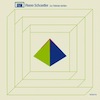Pierre Schaeffer, "Le Trièdre Fertile"
The last composition saw  Pierre Schaeffer break from his long standing experiments with manipulating recordings of real-life sounds, away from the concrète and closer to something more akin to the electronic works of Henri Pousseur or Karlheinz Stockhausen. Utilising only synthesized sounds, this album is a tantalizing glance down a path that Schaeffer never fully explored but based on these pieces, the results of such explorations would be mind-blowing.
Pierre Schaeffer break from his long standing experiments with manipulating recordings of real-life sounds, away from the concrète and closer to something more akin to the electronic works of Henri Pousseur or Karlheinz Stockhausen. Utilising only synthesized sounds, this album is a tantalizing glance down a path that Schaeffer never fully explored but based on these pieces, the results of such explorations would be mind-blowing.
This inaugural release for yet another new Editions Mego sub-label, Recollection GRM, will be the first of many classic or unsung musique concrète releases from the GRM archives (also reviewed this week is an LP by Guy Reibel). This particular version of Le Trièdre Fertile has been reissued on CD several times (including the many instances of INA GRM’s wonderful L’Œuvre Musicale box set) but this is the first time it has been issued on vinyl and the sleeve has been given a facelift by Stephen O’Malley. Before I even put the needle down, I am impressed by the care and quality of the album and after I put the needle down, the music makes me forget these material things.
Immediately, it is obvious from the opening seconds of "Plutôt Dynamique (Étude Banale)" that this will be a very different Schaeffer record. The clean, buoyant electronic sounds (generated for Schaeffer by Bernard Dürr) are miles away from the rough concrète sounds of his earlier works. Here, Schaeffer employs a clinical precision that I would associate more with something from a recent Raster-Noton release than an almost 40-year-old recording. Throughout the various movements, Schaeffer takes the themes outlined in the opening section and manipulates, edits and adds to them to form an ever-evolving change in color and mood. Amazingly, it still sounds utterly futuristic in the way that great science fiction from the middle of the 20th century remains prescient and applicable now despite the massive advances in knowledge and technology.
While the range of tones used by Schaeffer are quite limited, he nevertheless uses them to create a vivid and detailed work that draws on his concrète-style insight but with a musical inventiveness that has been absent in his earlier works. "Moins Banal (Interlude, ou Impromptu)" could be a piece of soundtrack music; rhythmic and melodic enough not to offend but strange and suspenseful enough to be more than an exercise or study in technique. Similarly, "Tocccata et Fugue" is a proto-dance work that could be one of Kraftwerk’s weirder moments or even an outtake from Throbbing Gristle’s 20 Jazz Funk Greats.
It would have been great if Schaeffer had made more compositions in this style but in his later years he devoted more time to teaching before tragically succumbing to Alzheimer’s prior to his death in 1995. I can only dream about what sort of sounds or approaches he might have developed. However, as a parting gift to the world, it is very hard to fault Le Trièdre Fertile which is a stroke of genius by any standard, including those of a man who had previously shook the very idea of music to its core.
samples:
 




